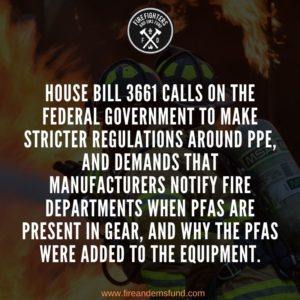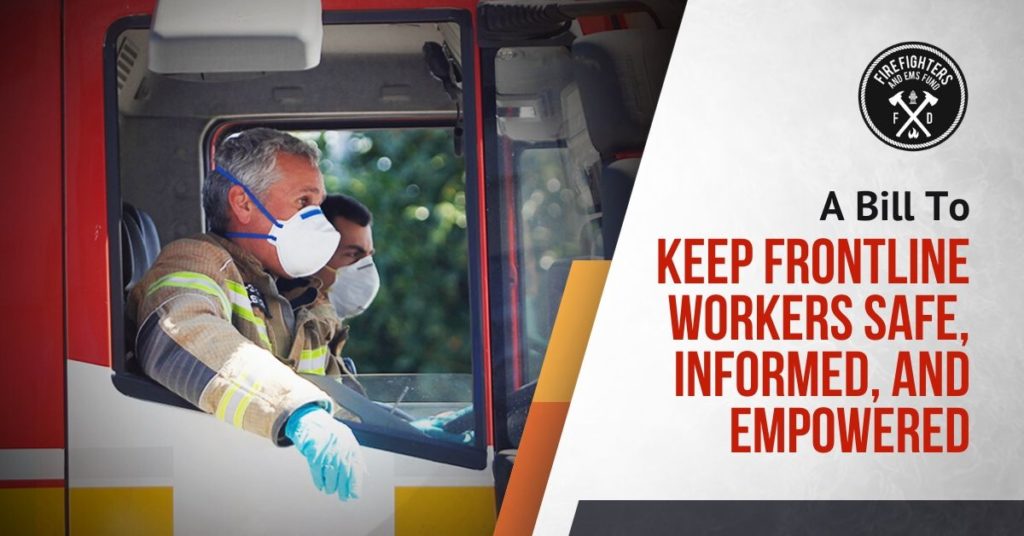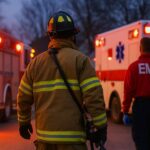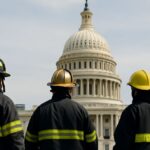Being a firefighter is a selfless, yet risky career path. Running into inflamed buildings, responding to natural disasters, and diving head-first into potentially fatal situations for the good of the public comes with an increased risk of injury and death. It doesn’t feel surprising that one might find themselves attending one, two, or in the case of Democractic Representative James Hawkins, D-Attleboro, three firefighter funerals within a single year. But when Rep. Hawkins went to pay his respects to these three fallen heroes, he knew it wasn’t a single perilous event that took their lives. All three firefighters died from cancer, and it wasn’t a coincidence.
Rep. Hawkins knew he had to do something to address the mounting cases of cancer in the firefighter community. He filed House Bill 3661 last year, after attending these funerals. The bill is intended to address a surprising source of chemicals that are clinically proven to potentially cause cancer–personal protective equipment. Also known as PPE, this equipment is an essential part of the job for firefighters and EMS professionals. The bill would require vendors or manufacturers selling PPE that are known to contain per- and polyfluoroalkyl (PFAs), to provide a written notice to the buyer upon purchase. Representative Hawkins told the News Service “We have this image of firefighters getting hurt in a very dramatic fashion, and the truth is that’s not what’s happening. They get sick and worse, that’s mostly cancer.”

While not commonly discussed, it’s no secret that cancer is prevalent in the firefighter community. In fact, it’s the most dangerous threat to a firefighters health and safety. Cancer caused 61 percent of firefighter line-of-duty deaths from January 1, 2002, to March 31, 2017, according to data from the International Association of Fire Fighters (IAFF). Firefighters have a 9 percent higher risk of being diagnosed with cancer and a 14 percent higher risk of dying from cancer than the general U.S. population, according to research by the CDC/National Institute for Occupational Health and Safety (NIOSH). There are various sources where firefighters may be exposed to lethal substances. Older buildings, where most fires take place, are often filled with asbestos and other toxic building materials that are inhaled when inflamed. Diesel fuel, which fire trucks require to operate, is also hazardous. This becomes even more dangerous when fire stations are forced to respond to calls without proper exhaust filters, which many are forced to do due to lack of funding. Firefighters rely on use of PPE to aid in the prevention of toxic fumes and particles–but where do they turn when those tools are also proven to contain carcinogens?
House Bill 3661 specifically addresses PFAS in PPE. PFAs are used for their ability to resist grease, water, and oil. Due to concerns about exposure and potential health effects, the Environmental Protection Agency (EPA) formed a PFOA Stewardship Program designed to eliminate the use of PFOA along with other long-chain PFAS in manufacturing in the United States. While they’ve been removed from household products like cleaning supplies, stain-resistant upholstery, and non-stick cookware, PFAs are still found in firefighter equipment. Water-repellent fabrics, firefighting foam, and other bunker gear have all historically been made with PFAS, and traces of chemicals are still found in equipment even after manufacturers have moved to remove these chemicals from their processes. It’s suspected that legacy gear manufactured before regulations were put in place still contain the chemicals, and that current gear has a newer version of the chemicals that are still being studied.
What does this mean for firefighters? That even the gear that is designed to protect them from fires and toxic chemicals is likely to make them sick. Even more alarming is the increased use of PPE during the COVID-19 pandemic. While this bill was designed to address cancer in the fire industry, it’s also a step in the right direction for doctors, police officers, grocery store workers; anyone who relies on the use of PPE to prevent illness. House Bill 3661 calls on the federal government to make stricter regulations around PPE, and demands that manufacturers notify fire departments when PFAS are present in gear, and why the PFAs were added to the equipment. The bill is gaining momentum in the house, and is currently awaiting its third reading. While the bill by no means eliminates the risk for cancer in the firefighter community, it is a step in the right direction for more protection and stringent regulation for our heroes. How can you help? Call your local representatives and advocate for Bill 3661, and demand protections for the people who risk their lives every day to keep us safe!









